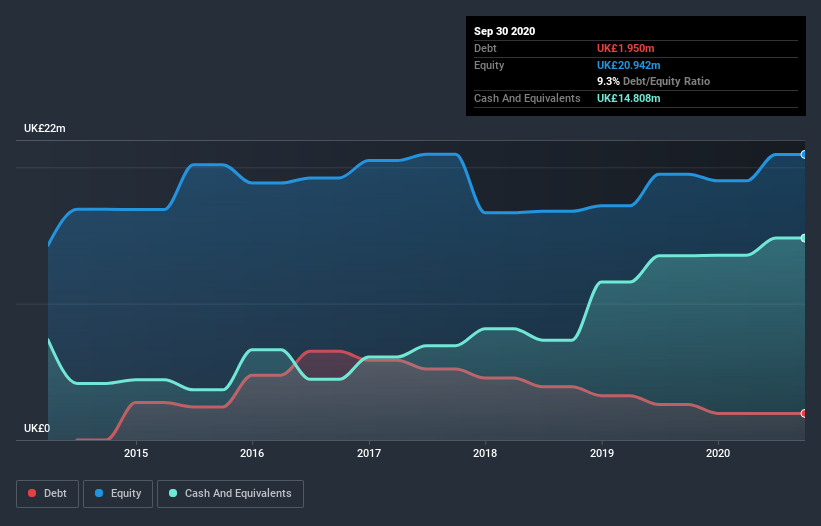Eckoh (LON:ECK) Seems To Use Debt Quite Sensibly
The external fund manager backed by Berkshire Hathaway's Charlie Munger, Li Lu, makes no bones about it when he says 'The biggest investment risk is not the volatility of prices, but whether you will suffer a permanent loss of capital.' So it seems the smart money knows that debt - which is usually involved in bankruptcies - is a very important factor, when you assess how risky a company is. Importantly, Eckoh plc (LON:ECK) does carry debt. But should shareholders be worried about its use of debt?
When Is Debt A Problem?
Debt and other liabilities become risky for a business when it cannot easily fulfill those obligations, either with free cash flow or by raising capital at an attractive price. Ultimately, if the company can't fulfill its legal obligations to repay debt, shareholders could walk away with nothing. However, a more frequent (but still costly) occurrence is where a company must issue shares at bargain-basement prices, permanently diluting shareholders, just to shore up its balance sheet. Of course, the upside of debt is that it often represents cheap capital, especially when it replaces dilution in a company with the ability to reinvest at high rates of return. The first step when considering a company's debt levels is to consider its cash and debt together.
See our latest analysis for Eckoh
How Much Debt Does Eckoh Carry?
As you can see below, Eckoh had UK£1.95m of debt at September 2020, down from UK£2.60m a year prior. However, its balance sheet shows it holds UK£14.8m in cash, so it actually has UK£12.9m net cash.
How Healthy Is Eckoh's Balance Sheet?
We can see from the most recent balance sheet that Eckoh had liabilities of UK£19.9m falling due within a year, and liabilities of UK£1.27m due beyond that. On the other hand, it had cash of UK£14.8m and UK£12.3m worth of receivables due within a year. So it actually has UK£6.01m more liquid assets than total liabilities.
This short term liquidity is a sign that Eckoh could probably pay off its debt with ease, as its balance sheet is far from stretched. Simply put, the fact that Eckoh has more cash than debt is arguably a good indication that it can manage its debt safely.
On the other hand, Eckoh's EBIT dived 17%, over the last year. If that rate of decline in earnings continues, the company could find itself in a tight spot. The balance sheet is clearly the area to focus on when you are analysing debt. But ultimately the future profitability of the business will decide if Eckoh can strengthen its balance sheet over time. So if you want to see what the professionals think, you might find this free report on analyst profit forecasts to be interesting.
Finally, a company can only pay off debt with cold hard cash, not accounting profits. Eckoh may have net cash on the balance sheet, but it is still interesting to look at how well the business converts its earnings before interest and tax (EBIT) to free cash flow, because that will influence both its need for, and its capacity to manage debt. Over the last three years, Eckoh actually produced more free cash flow than EBIT. There's nothing better than incoming cash when it comes to staying in your lenders' good graces.
Summing up
While we empathize with investors who find debt concerning, you should keep in mind that Eckoh has net cash of UK£12.9m, as well as more liquid assets than liabilities. And it impressed us with free cash flow of UK£4.5m, being 212% of its EBIT. So we are not troubled with Eckoh's debt use. Of course, we wouldn't say no to the extra confidence that we'd gain if we knew that Eckoh insiders have been buying shares: if you're on the same wavelength, you can find out if insiders are buying by clicking this link.
When all is said and done, sometimes its easier to focus on companies that don't even need debt. Readers can access a list of growth stocks with zero net debt 100% free, right now.
This article by Simply Wall St is general in nature. It does not constitute a recommendation to buy or sell any stock, and does not take account of your objectives, or your financial situation. We aim to bring you long-term focused analysis driven by fundamental data. Note that our analysis may not factor in the latest price-sensitive company announcements or qualitative material. Simply Wall St has no position in any stocks mentioned.
Have feedback on this article? Concerned about the content? Get in touch with us directly. Alternatively, email editorial-team (at) simplywallst.com.

